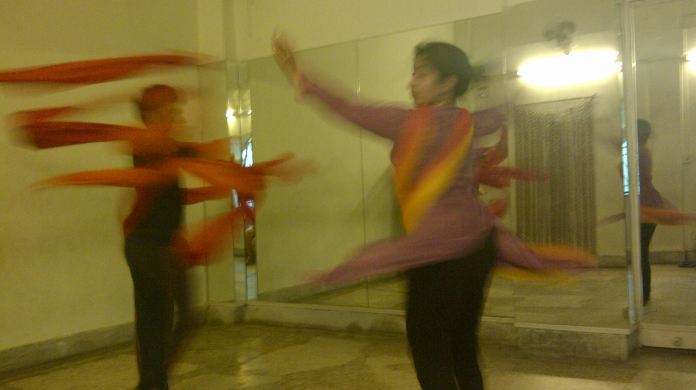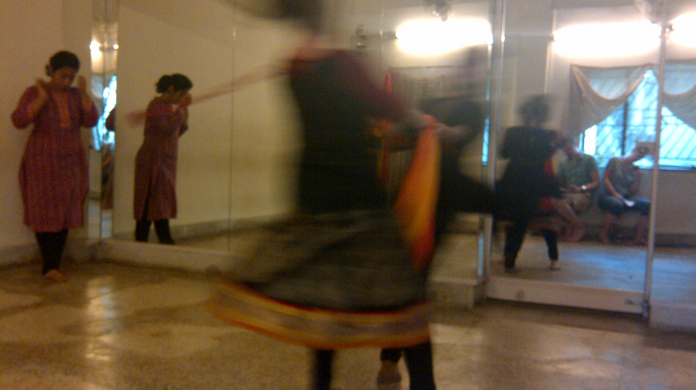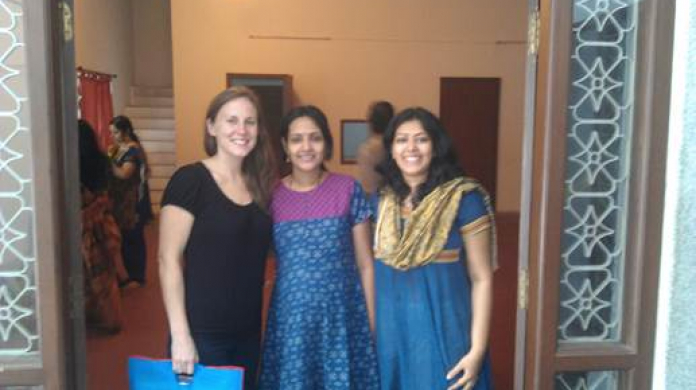In difficult financial times, are there new ways to approach international collaboration? And do we have a right to tell stories from different cultures? Analogue Theatre Company’s trip to India had a fundamental impact on the show they want to create, the process by which they make it and the international collaborations they would like to develop.
Telling tall tales
We went to India with a desire to learn as much as we could about Indian dance as storytelling, to see as much work as possible and explore opportunities for international collaboration. We took with us the extraordinary story of one man’s journey from India to the UK concealed in the wheel arch of a plane. With it also came the lingering question of whether we had a right to tell this story.
Our two-and-a-half week journey took us from Chennai to Kolkata, from national concerts to rehearsal studios, lecture halls to school classrooms. It introduced us to dance styles traditional and modern – Kuchipudi, Bharatayam, Kathak – and carried us into talks and discussions about the benefits and limitations of international collaborations.
We divided our time between two very different and very inspirational dance companies: Chennai-based Rasoham, who bring together the classical dance forms with a desire for social change, and Ranan in Kolkata who explore dance using a more modern devising method. Both had appealed to us as more than just dance companies. They are facilitators of discussion and cross-discipline collaboration, challenging the lines between storytelling, and dance, politics and social engagement.
With every meeting, we were offered a new interpretation of our story, each a contradiction of the last. It soon became apparent that our show would need to encompass all these voices as well as those that inspired and influenced those voices – people and characters from history and literature – if we were to tell the story of this man’s journey in the right way. The potential collaborators we had gone to India to meet now extended way beyond those on our itinerary.
But how could one show encapsulate the plurality of all these important voices?
In conversation with Rasoham and Ranan, we began to interrogate how we could realise a different kind of collaboration. We asked whether it felt appropriate to expose all these exciting international artistic expressions to the inevitable translation and dilution that comes with making a ‘universal’ piece of theatre. The thought of importing what we wanted from these Indian-based dance companies into our own version of this man’s story to parade to mainly Western audiences suddenly appeared to be another kind of post-Empire pillaging.
And so we began to develop the idea of a wider project. A project where the show we make sits among other interpretations of this one man’s journey. We want to generate a series of commissions, engaging with artists at home and abroad, taking the form of artistic works, essays, interviews, lectures, discussion, happenings, exhibitions, workshops, film, dance, installation and more. We want to collate these pieces into a more accessible and interactive forum than can be created by any one touring show.
When we applied for the British Council’s Connections through Culture India-UK programme, we said this show was a giant metaphor for the initiative – the flight of one man from India to the UK, representing East meets West. This trip to India, however, has highlighted that this man’s journey is more than a simple metaphor. At its core are two questions. How - if at all - can we genuinely connect through culture? How we can tell a story that belongs in part to a country thousands of miles away, with a complex imperial history so entangled with our own?
Carrying such a legacy, we struggle to properly address it. We would now like to create a forum that invites a multitude of voices to the table and celebrates the different interpretations in their entirety.
Hannah Barker is Co-Artistic Director and Lewis Hetherington is Associate Writer at Analogue Theatre Company. They visited India from November to December 2012 as part of the British Council’s Connections through Culture India-UK programme, in order to research a new production, Stowaway.They are currently developing Stowaway and plan to premiere it in 2014.
Are you an England-based artist interested in developing an international experience for your professional development? Our Connections through Culture programme has ended but check out the Artists’ International Development Fund, which we deliver with Arts Council England.
Follow us on Twitter at @UKDramaDance for our latest updates and blogposts


